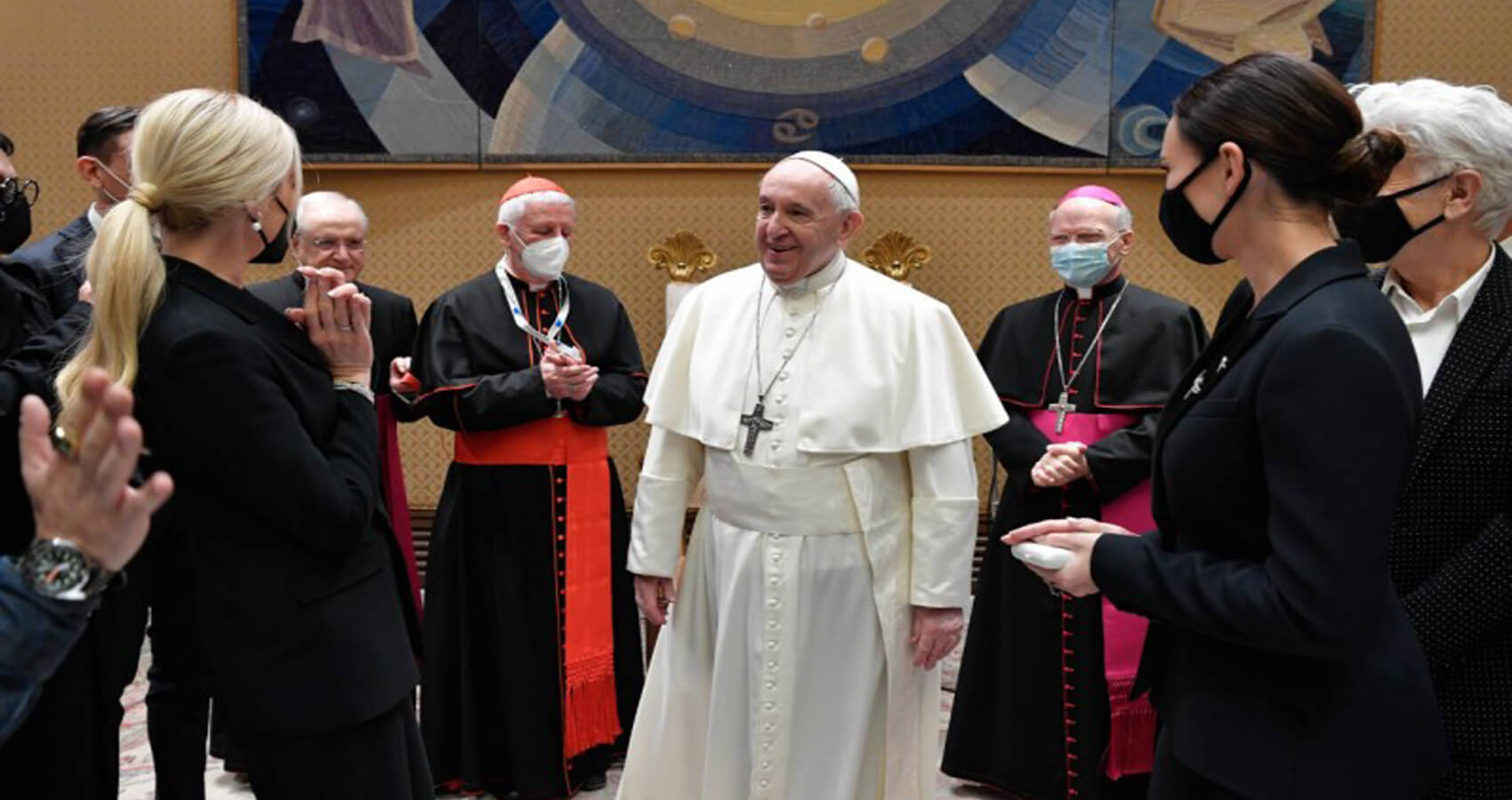Pope Francis pointed to three characteristics of art that can play an important role during this challenging Christmas season in which “the somewhat dimmed Christmas lights invite us to keep in mind and to pray for all those suffering from the pandemic.”
His comments came when he received the musicians who participated in this year’s Vatican Christmas Concert, gather in a meeting room adjacent to the Vatican’s Paul VI Hall. Artists everyone would no doubt appreciate his presentation of three artistic impacts:
“A first movement has to do with the senses, which are struck with wonder and amazement. This initial, outer movement then leads to others, more profound.
“A second movement touches the depths of our heart and soul. A composition of colors, words, or sounds has the power to evoke within us memories, images, and emotions…
“There is a third movement, in which the perception and contemplation of beauty generates a sense of hope that can light up our world.”
In light of the pandemic, the Holy Father praised the hope that art brings and thanked the musicians for their participation in the concert.
Following are the Holy Father’s full remarks, provided by the Vatican.
Dear artists and dear friends,
I greet all of you most cordially and I thank you for your presence. This year, the somewhat dimmed Christmas lights invite us to keep in mind and to pray for all those suffering from the pandemic. In this situation, we have come to realize even more powerfully how dependent we are on one another. Our gathering today gives me an opportunity to share with you a few thoughts on art and its role at this critical moment in our history.
We can speak of artistic creation in terms of three “movements”. A first movement has to do with the senses, which are struck with wonder and amazement. This initial, outer movement then leads to others, more profound.
A second movement touches the depths of our heart and soul. A composition of colors, words, or sounds has the power to evoke within us memories, images, and emotions…
Yet artistic creation does not stop here. There is a third movement, in which the perception and contemplation of beauty generates a sense of hope that can light up our world. The outer and inner movements merge and in turn affect our way of relating to those all around us. They generate empathy, the ability to understand others, with whom we have so much in common. We sense a bond with them, a bond no longer vague, but real and shared.
This threefold movement of wonder, personal discovery, and sharing produces a feeling of peace, which – as the example of Saint Francis shows – frees us from the desire to dominate others, makes us sensitive to their difficulties, and prompts us to live in harmony with all.[1] A harmony deeply associated with beauty and goodness.
That association is very much a part of the Jewish and Christian tradition. The Book of Genesis – in speaking of God’s creative work – emphasizes that he contemplated his creation and “saw that it was good” (Gen 1:12.18.25). In Hebrew, that word “good” has a wide range of meanings, and can also be translated as “harmonious”.[2] Creation amazes us by its magnificence and variety, while at the same time making us realize, in the face of that grandeur, our own place in the world.
Artists know this. As Saint John Paul II wrote, they “perceive in themselves a kind of divine spark which is the artistic vocation”, and are called “not to waste this talent but to develop it, in order to put it at the service of their neighbor and of humanity as a whole”.[3]
In his famous Message to Artists on 8 December 1965, at the conclusion of the Second Vatican Council, Saint Paul VI described them as being “in love with beauty”.[4] He noted, too, that our world “needs beauty in order not to sink into despair”.[5] Amid the anxiety provoked by the pandemic, your creativity can be a source of light. The crisis has made even denser the “dark clouds over a closed world” (cf. Fratelli Tutti, 9-55), and this might seem to obscure the light of the divine, the eternal. Let us not yield to that illusion, but seek the light of Christmas, which dispels the darkness of sorrow and pain.
Dear artists, in a special way you are “guardians of beauty in our world”.[6] I thank you for your spirit of solidarity, which is all the more evident in these days. Yours is a lofty and demanding calling, one that requires “pure and dispassionate hands”[7] capable of transmitting truth and beauty. For these instill joy in human hearts and are, in fact, “a precious fruit that endures through time, unites generations and makes them share in a sense of wonder”.[8] Today, as always, that beauty appears to us in the lowliness of the Christmas crèche. Today, as always, we celebrate that beauty with hearts full of hope.
I am deeply grateful to Don Bosco Missions and Scholas Occurrentes for the commitment and spirit of service with which they are responding to the educational and health emergency through their projects inspired by the Global Compact on Education. Again, thank you, best wishes and enjoy the concert!

